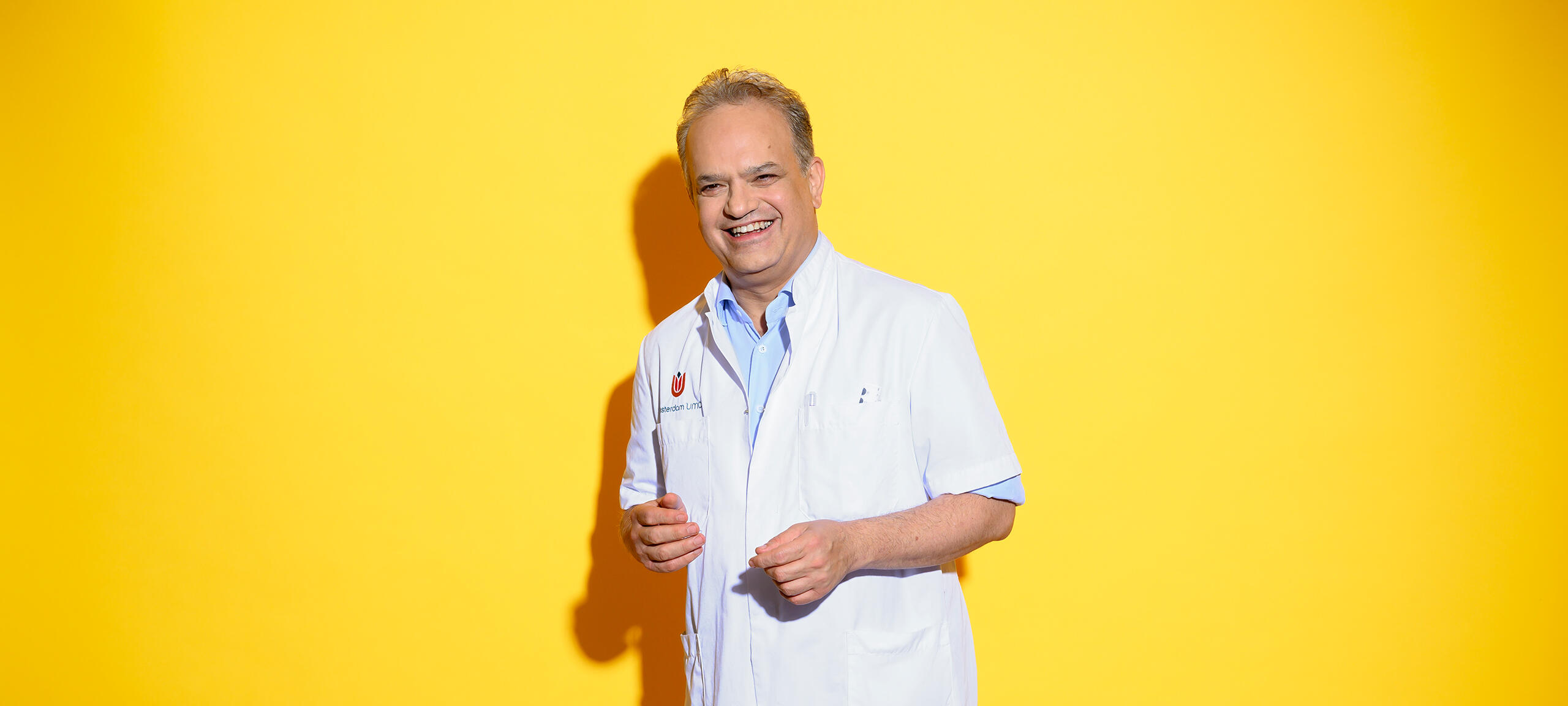"Did you know that more nationalities live together here than in New York? Even within the walls of Amsterdam UMC, it's a big melting pot."

Role model Peerooz Saeed
• 5 minuten leestijd
Who?
"I'm part of the furniture here by now." At eighteen Peerooz Saeed, head of the Orbita Center (ophthalmology), traded Iran for Amsterdam. He studied medicine at location AMC and, except for a two-year Orbita subspecialty in Canada, he never left the nest. "Hence in my thesis also the statement: I am an Amsterdammer. Amsterdam - with workplace Amsterdam UMC - is my second home, it became my refuge when I came to the Netherlands."
"Do you know that more nationalities live together here than in New York? And also within the walls of Amsterdam UMC it is a big melting pot. Multiculturalism is an essential characteristic of the city. That the statue of Spinoza has such a prominent place in this city, a stone's throw from the city hall, says it all. A Portuguese Jew, who had been outcast by his own Jewish community! To me, that image is a beautiful expression of inclusion. Which, of course, is not to say that we always treat each other with kindness here."Specialty?
"I am really proud that the Amsterdam Orbital Center has been a household name in the world for more than fifty years." Saeed co-developed the expertise that is there to this day and for which the whole world comes to Amsterdam. "The Orbital Center has two special areas of expertise: Graves' eye disease and tumors of the eye socket. We work together with endocrinologists, ENT physicians, neurosurgeons, radiologists, head-neck oncologists, you name it. Every week we have a multidisciplinary Graves consultation, called a diagnostic street. On one day the patient receives all examinations and consultations, and at the end of the day a treatment plan rolls out. We also have a similar multidisciplinary consultation for eye tumors, for which we receive national and international referrals. We are really proud of those consultations."
Saeed also gets a lot of energy from training fellows, specialists from a foreign hospital, who come here to further study a subspecialty. "I have the honor of training people from all over the world," he says. For that training, he also sometimes goes on missions. In 2003, he founded WAMA (Worldwide Access to Medical Advances) to make medical knowledge accessible to emerging countries. "From Suriname to Serbia, from Mozambique to Vietnam, with the WAMA foundation medical specialists like me share their knowledge and provide local training to improve local medical care. Among other things I have helped set up a medical center for the treatment of Graves in Serbia. Graves patients from all over the Balkans are now receiving treatment there; it's fantastic that this has succeeded."
Why are you committed to healthcare?
"My moments as a child at the family doctor's office, I found them magical. The stethoscope, for example, was equivalent to a magic wand for me. During one of those visits, I decided: left or right, I will become a doctor. As a doctor, you can improve the quality of someone's life. That's insane, right?"
Amsterdam UMC is going for diverse and inclusive. Where are the opportunities?
"Diversity is now being pursued, for example, by increasing the percentage of female professors. But this is a form of pigeonholing, in this case the pigeonholing of gender, which I don't think fits with a more inclusive society. But that stopping of pigeonholing seems to be possible only if we first increase the presence and visibility of people from underrepresented categories. Prejudice will not disappear without the presence of people from minority groups. Incentive policies must therefore be that first step. But in the end, of course, you want it to stop being about whether a professor is male, female, black or white. You want to move toward a diversity mindset in which differences are seen as normal rather than deviations."
"As for inclusion, that's partly about people letting you in. But I think it's even more important that you yourself want to become part of something. Your own attitude plays a important role. For example, you have to call yourself a Dutchman or an Amsterdam UMC graduate and really believe in that. And as part of that, you have to make the language and cultural codes your own. Without that mindset, inclusion becomes a difficult story. Ultimately, everyone should strive for global citizenship, by being curious about how others live, and interested in their thoughts and feelings. An attitude that ultimately makes it possible to learn to deal better with differences between people anywhere in the world. And also to benefit from them. Because those differences, that's also where our strength lies."
Outside of working hours?
"Because I like to cook myself, I agree with all the fellows that at the end of their apprenticeship they will teach me to make one or two dishes from their country. By now I have mastered five or six Singaporean curries. Each dish is a piece of culture that you just get on your plate, which fascinates me. It gives information about the customs, the location of a country. And being able to cook is a plus for anyone who wants to become a good surgeon. It means that you can be creative with what is available to you, and know how to improvise quickly in case of setbacks."
"Art also plays an important role in my life. Actually for the same reason as cooking: it is ideally suited to get to know other cultures, stories and backgrounds and to nurture your world citizenship."
Do you have any questions for Peerooz or would you like to know more about diversity & inclusion within Amsterdam UMC. If so, please email diversiteit@amsterdamumc.nl
Text: Sophie Verschoor
